#Nizami Ganjavi
Text
"My longing for you is the consolation of my heart, its wounds and its healing salve."
— Nizami Ganjavi
#ughhh#notes to my forever love#words#nizami ganjavi#poetry#love poetry#words words words#longing#arabic poetry#love#romance#spilled ink#spilled feelings#spilled words
204 notes
·
View notes
Text
... soul-nursing, ruby lips.
[...] I am the bewildered Farhād,
and you are my sweet-tongued Shīrīn.
— Amir Khusrau, In the Bazaar of Love: The Selected Poetry of Amir Khusrau, transl by Paul E. Losensky & Sunil Sharma, (2011)
#Indian#Amir Khusrau#In the Bazaar of Love#The Selected Poetry of Amir Khusrau#Paul E. Losensky#Sunil Sharma#(2011)#Farhad#Shirin#Khosrow and Shirin#Nizami Ganjavi
17 notes
·
View notes
Quote
If only the wind could touch your lips and bring your kisses to me, but then I should be jealous of the wind and ashamed of myself for asking.
Nizami Ganjavi, in Layla and Majnun.
#poetry#classics#persian literature#layla and majnun#nizami ganjavi#romance#novels#books#love#quotes#words#thoughts#literature
55 notes
·
View notes
Text
book review: layla and majnun by nizami ganjavi | 1192

summary:
the origin of the sad tale of majnun and layla dates back to antiquity. the legend of their love, originally developed on arab ground, subsequently became widespread throughout the muslim east among many peoples. over time, this story acquired rights in iran, central asia, and azerbaijan. the images of majnun and layla unceasingly haunted the imagination of many poets, but it was nizami ganjavi whose immortal work has contributed to an even greater spread of the tragic love story of layla and majnun.
my opinion:
i want to start by saying that the book itself may not be as bad as i would have thought it was, but the problem lies in the translation. i will sincerely say that colin turner's translation is terrible, i thought my reading would end when i saw the word "ok" in the translation. really? "ok" in an adaptation of a 12th century work?
so most likely my score is so low due to the failure of the translator, alas i couldn't find james atkinson's translation.
but if we go straight to the book, i would say it's not bad, judging by the work of the author and not the translator.
the first thing i thought of was romeo and juliet from the 12th century, and then it wasn't that bad. but then it went on to become a total exaggeration. qays became so obsessed with love that he became, roughly speaking, insane. probably today he could even be called a stalker.
i mean he was offered help, he accepted it, he was given food and water and all cleaned up, and then he brought up his doomed love again and turned away from everyone. it even seemed a little mercenary to me.
it also shown that layla suffers too, and just to compare what the position of girls in the east was in those days: she was forbidden to see her lover, and her tears were considered a disease, she was forcibly married off and her husband harassed her.
their love was doomed just because of the it - the love was so strong that it drove the man mad.
speaking of the good side, i think of the following:
• we were shown the torment of the lovers, that is, it was not dry material, but filled with action;
• no matter how it sounds, we were shown the power of love, what it can lead to and what it motivates people to do;
• it was interesting to see the euphemism of belief underneath of love, cause love is as strong as belief.
• how trust and resilience are played out. layla's father, even after the defeat of his troops, still refused to give up his daughter because he understood that he would burden her with an unhappy life.
• as well as majnun's trust in his friend, and his loyalty, eagerness to help the young man reunite with his beloved.
and to summarize, i can say that the book is not that bad, but it will probably be difficult to understand for modern people, just as it was difficult for me. there is a thin line between belief, love and madness, which the characters could have crossed any minute. but i was probably satisfied with the ending, even as death separated them, perhaps it will give them some privacy.
my rating:
2.8/5

two lovers lie sleeping in this tomb,
united at last in death’s dark womb.
faithful in separation, true in love:
one heart, one soul in heaven above.

#book review#nizami ganjavi#layla and majnun#literature#arab literature#persian literature#fiction#novel#books
3 notes
·
View notes
Text
From Ferdowsi to the Seljuk Turks, Nizam al Mulk, Nizami Ganjavi, Jalal ad-Din Rumi & Haji Bektash
By Prof. Muhammet Şemsettin Gözübüyükoğlu (Muhammad Shamsaddin Megalommatis)
Pre-publication of chapter XXIII of my forthcoming book “Turkey is Iran and Iran is Turkey – 2500 Years of indivisible Turanian – Iranian Civilization distorted and estranged by Anglo-French Orientalists”; chapter XXIII constitutes the Part Nine (Fallacies about the Golden Era of the Islamic Civilization). The book is made of 12 parts and 33 chapters.
----------------------------------------------------
Read and download the chapter here:
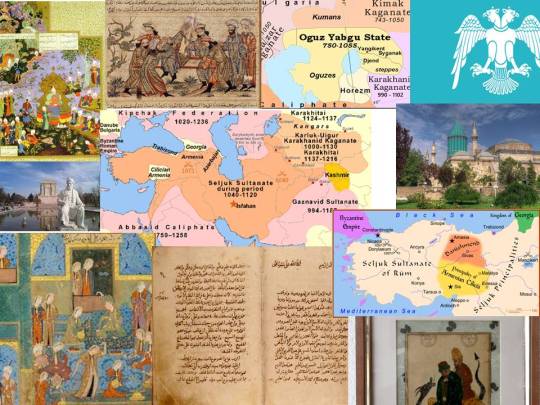
#Ferdowsi#Seljuk Turks#Seljuk#Seljuq#Nizam al Mulk#Nizami Ganjavi#Jalal ad-Din Rumi#Haji Bektash#Gözübüyükoğlu#Shamsaddin Megalommatis#Megalommatis#Orientalism#Iranology#Turkology#Iranian Studies#Anatolia#History of Islamic Anatolia#Islamic Iran#Islamic Studies#Islamology#Tus#Khorasan#Shahnameh#Messianism#Eschatology#Soteriology#Muhammad ibn al-Askari#Twelfth Imam#Islam#Sunni
3 notes
·
View notes
Quote
Sit no longer unheeding; if thou hast water pour it out on the threshold of the Heart.
In the curve of this lovely azure dome, sing the beautiful song of the Heart.
Escape from the senses which are the robbers. The Heart knows thy road, know thou the Heart.
These heavenly wayfarers who are free from the body, have fastened the pinions of the Archangel Gabriel to their Hearts,
And he who has abandoned both worlds, receives nourishment by begging at the door of the Heart.
If this material water and clay were the Heart, thou must admit that the ass also has a Heart.
All creatures live in virtue of their life; live thou by the Heart, that is true life.
Nizami Ganjavi, from ‘Describing the night and cognizing the heart‘ in Makhzanol Asrar: The Treasury of Mysteries, trans. Gholam Hosein Darab, lines 554-60.
3 notes
·
View notes
Text
Salâm! I’ve been trying to find the historical basis for Turandot from the opera of the same name. I came across a source where it stated she really did exist, but I’m not 100% certain on that.
Could you all help me? Thanks in advance.
6 notes
·
View notes
Text
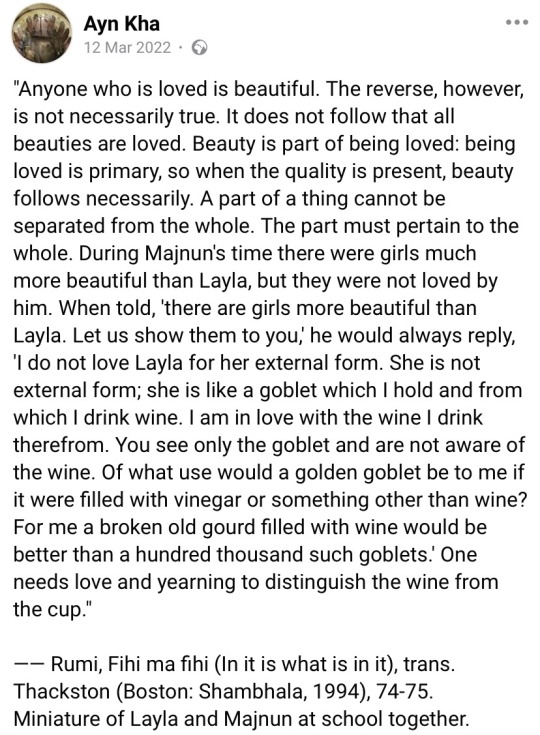
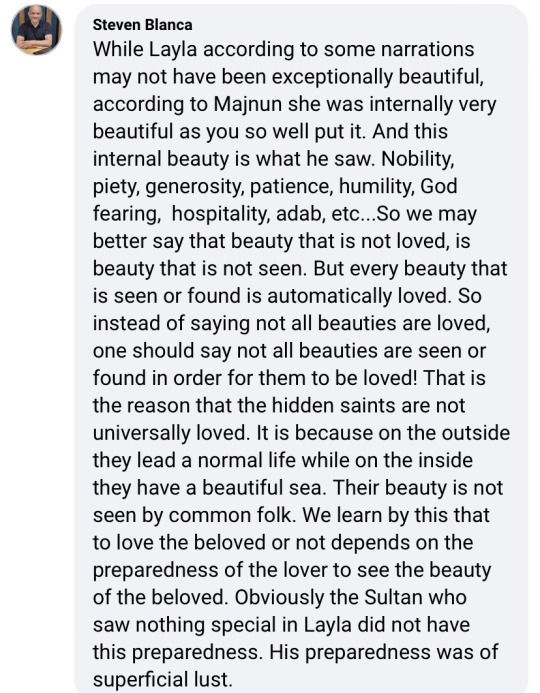
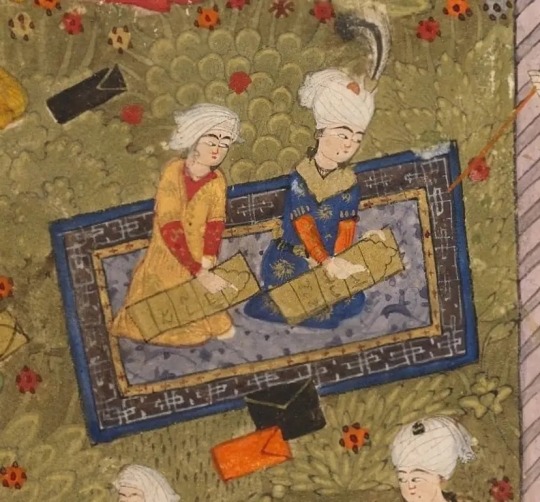
0 notes
Photo
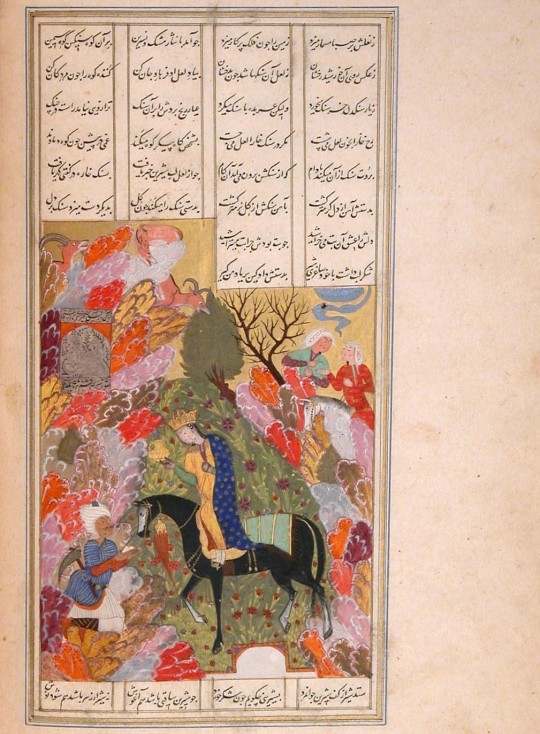
Khamsa of Nizami
Khamsa (also known as Quintet or Panj Ganj) is the best-known work of Nizami Ganjavi (c. 1141- 1209 CE) and without a doubt one of the most prominent works of Persian literature. Written during the last decades of the 12th century CE, the Khamsa of Nizami contains five poems and approximately 30,000 couplets.
Continue reading...
121 notes
·
View notes
Text
The legend of Khusrau
[…] carries the scent of Farhād’s anguished heart.
— Amir Khusrau, In the Bazaar of Love: The Selected Poetry of Amir Khusrau, transl by Paul E. Losensky & Sunil Sharma, (2011)
#Indian#Amir Khusrau#In the Bazaar of Love#The Selected Poetry of Amir Khusrau#Paul E. Losensky#Sunil Sharma#(2011)#Farhad#Shirin#Khosrow and Shirin#Nizami Ganjavi
2 notes
·
View notes
Quote
After all, those who are in comfort have no feeling for those who are in misery. What do the rich know about poverty? What does the full stomach care about those who starve? We are both human beings: does our common humanity mean nothing to you? Are you content to blossom and bloom while I wither and die?
Nizami Ganjavi, in Layla and Majnun.
19 notes
·
View notes
Text
Refleksi Asal-asalan Soal Cinta
Sedikit berkaca di masa awal remaja hingga sekarang, mungkin saja aku bisa menyebut diriku pujangga amatiran; yang sesekali saja membaca karya sastra para pujangga senior Indonesia sekaliber Sapardi, WS Rendra, Chairil Anwar, hingga sesepuh para pujangga dunia seperti Nizami Ganjavi, atau novel-novel romansa ringan punya Tere Liye.
Sesekali timbul pertanyaan nyeleneh, yang tak jarang akhirnya ‘menemukan jawabannya sendiri’. Ya, diri bertanya dan menjawab sesukanya, pikiran berkecamuk — pikiran sendiri yang menenangkannya. Sekilas tampak seperti orang gila(?). Namun bukan pujangga namanya jika cinta tak pernah mampir dalam banyolan-banyolan gilanya😅😂. Tapi tak perlu-lah se-merana Majnun untuk mendefinisikan cintanya kepada Layla. Cukup sedikit meramu kecamuk pikiran, bisa-lah kita sebut tadabbur cinta, haha.
Salah satu pertanyaan yang pernah mampir dan ‘terjawab sendiri’ adalah:
“Mengapa tercipta diksi ‘belahan jiwa’?”
Jawabannya:
“Mungkin saja karena jiwa selalu mencari ‘potongan dirinya yang lain’. Maka jika memang tak sejiwa, tak akan pernah bersatu pada akhirnya, karena sejatinya dia bukan-lah ‘potongan jiwa’ nya”.
Seperti dosis obat yang tak sesuai malah justru akan menambah sakit penderitanya. Seumpama donor darah; antara pendonor-penerima harus-lah ada kecocokan, jika tidak maka akan terjadi masalah–komplikasi yang lebih berat jika akhirnya dipaksakan. Maka ke-sejiwa-an itu memang ibarat puzzle, ia harus serasi, mesti-lah cocok, agar terbentuk pola yang sempurna (atau biasa kita sebut saling menyempurnakan).
Maka cobalah untuk tak berhenti mencari potongan jiwa kita, jika memang belum kita temukan. Dan jangan patah, jika akhirnya memang tak searah. Karena jiwa, akan selalu mencari–dicari ‘potongannya’ di bagian bumi manapun ia berada. Pun, pasrahkan pencarian kita pada pemilik jiwa itu sendiri, karena Dia yang akan dengan mudah mempertemukannya. Dengan namaNya, dengan keagungan rahasiaNya, dengan sifat-sifatNya yang Maha Cinta.
Selamat dan semoga selalu berbahagia, para pecinta!
47 notes
·
View notes
Text
Don't let your fear and sadness for the Palestinians situation silence you.
When you feel afraid, when your heart breaks seeing and hearing what they are going through.
Speak louder.
The Israeli forces are afraid of your voice.
It's why they are deleting their own tweets that incriminate them and their actions.
It's why they are lying and spreading a false narrative that excuses their actions.
It's why they want you to look away and turn off social media.
And why they turned off the Internet in Gaza when we refused to do so.
Big or small your voice has an impact.
Amplifying the voices of the Palestinians.
Educating yourself so that you can see through the Israeli and western medias lies.
Speak up.
Speak loud.
Don't let them silence you, because our voices are what the Palestinians want.
They are telling us to share their stories.
Talk about them as the people they are, their history their culture, their lives.
Israel wants to reduce them to statistics, to numbers, to make you see them as inhuman.
Just like they do.
But we know better.
And we should say it.
Even if what you say seems so small and insignificant that you think this won't do anything.
It will.
"In the hour of aderversity be not without hope. For crystal rain falls from black clouds. "
-Nizami Ganjavi
22 notes
·
View notes
Text
lately i've been fixated on Layla and Majnun story.
it's a very old story, from Arab origin in the 7th century. it's a love story between an Arab poet, Qays ibn Al Mulawwah and his lover, Layla. they fell in love but cannot be together, and Qays became some sort of obsessed and crazy about Layla. the term Majnun actually means crazy and he's called that because of his love towards her.
i've gotten myself a 'retelling' of this story, The Story of Layla and Majnun by Nizami Ganjavi which i'll read of course. i wish i could get or find the poem from Qays tho :') i've only found bits but i want to read the whole poem.
i wish i could get a real copy of the book or something like that tho. i feel like reading with the material in hands feel VERY different and more fun(?) than scrolling in my phone.
15 notes
·
View notes
Text
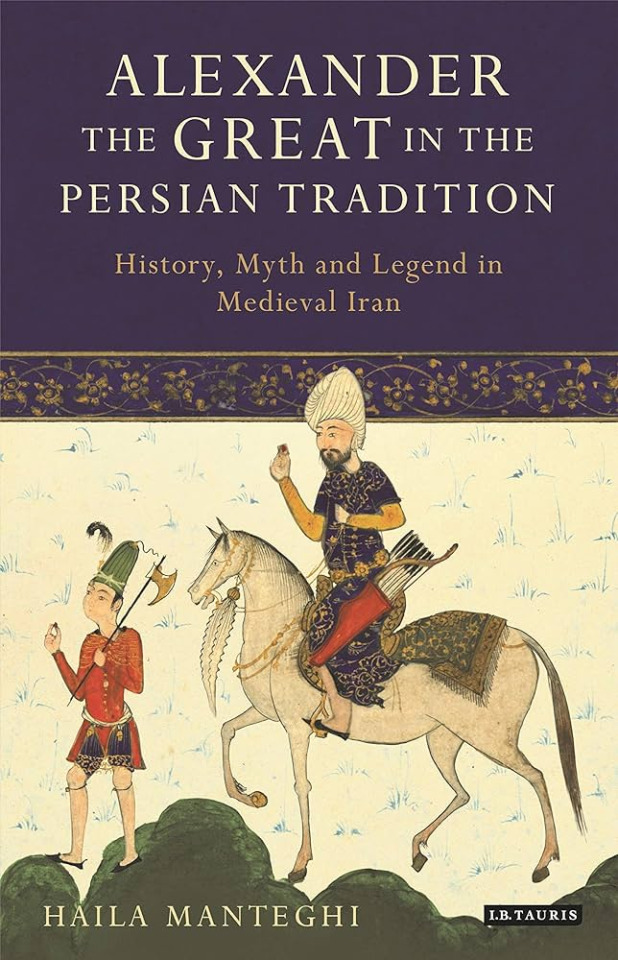
Alexander the Great in the Persian Tradition: History, Myth and Legend in Medieval Iran (Library of Medieval Studies)
Hardcover – May 30, 2018
by Haila Manteghi
Publisher: I. B. Tauris
Alexander the Great (356-333 BC) was transformed into a legend by all those he met, leaving an enduring tradition of romances across the world. Aside from its penetration into every language of medieval Europe, the Alexander romance arguably had its greatest impact in the Persian language. Haila Manteghi here offers a complete survey of that deep tradition, ranging from analysis of classical Persian poetry to popular romances and medieval Arabic historiography. She explores how the Greek work first entered the Persian literary tradition and traces the development of its influence, before revealing the remarkable way in which Alexander became as central to the Persian tradition as any other hero or king. And, importantly, by focusing on the often-overlooked early medieval Persian period, she also demonstrates that a positive view of Alexander developed in Arabic and Persian literature before the Islamic era. Drawing on an impressive range of sources in various languages - including Persian, Arabic and Greek - Manteghi provides a profound new contribution to the study of the Alexander romances. Beautifully written and with vibrant literary motifs, this book is important reading for all those with an interest in Alexander, classical and medieval Persian history, the early Islamic world and classical reception studies.
Table of Contents
Foreword (Richard Stoneman)
Introduction
Chapter One: Greek and Syriac Versions of the Alexander Romance and their Development in the East
Chapter Two: Arabic Accounts of Alexander the Great and the Legacy of Sasanian Historiography
Chapter Three: Alexander the Great in the Shahnama of Firdawsi
Chapter Four: Alexander the Great in the Arabic and Persian Popular Romances
Chapter Five: Alexander in the Iskandarnama of Nizami Ganjavi (1141–1209)
Chapter Six: Alexander in the Iqbalnama of Nizami Ganjavi
Conclusion
Appendix I: Summary of the Syriac Alexander Romance
Appendix II: Summary of Alexander's letter to Aristotle about the wonders of
India and China in the Syriac Alexander Romance (Book III, 7)
Appendix III: Alexander's Persian Genealogy
Bibliography
Haila Manteghi is a lecturer at the University of Munster and recently completed her second PhD on the Persian Alexandrian tradition, at the University of Exeter. Her first PhD, on the same topic, was completed at the University of Alicante, and she has published in peer-reviewed journals and edited collections.
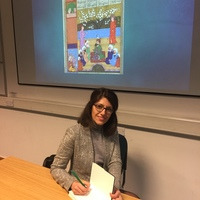
Haila Manteghi
11 notes
·
View notes
Text
Majnun
They tell me
"Crush the desire for Layla in your heart!"
But I implore thee, oh my God,
Let it grow even stronger.
Take what is left of my life and add it to Layla's.
Let me never demand from her as much as a single hair,
even if my pain reduces me to the width of one!
Let her punish and castigate me:
her wine alone shall fill my cup,
and my name shall never appear without her seal.
My life shall be sacrificed for her beauty,
my blood shall be spilled freely for her,
even though I bum for her painfully, like a candle,
none of my days shall ever be free of this pain.
Let me love, oh my God,
Love for love's sake,
and make my love a hundred times as great as it was and is!
-- Nizami Ganjavi --
An excerpt from the epic poem written about the love story of Layla and Majnun [Majnun: crazy; he was literally crazy in love with Layla]
#poem#epic poem#love poem#crazy in love#romantic poem#arabian poem#middle eastern poem#poetry#majnun#Layla and Majnun
19 notes
·
View notes